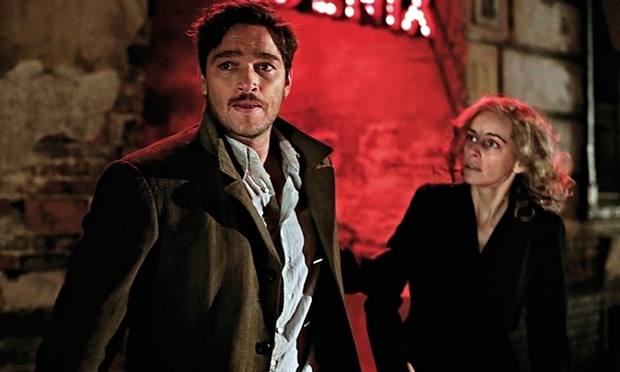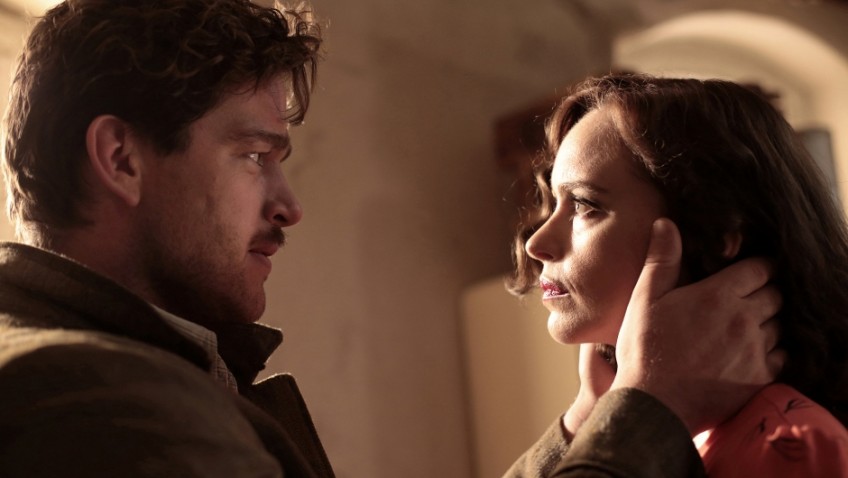Joyce Glasser reviews Phoenix (May 8, 2015)
A new Christian Petzold film is always a treat, and Phoenix, a post-World War II film noir set in Berlin, is no exception. While it is not as satisfying as the haunting, evocative Barbara (2012) and the astonishing Yella (2007), it is a joy to watch Nina Hoss transform herself into increasingly enigmatic, scarred, yet heroic heroines in her long collaboration with Petzold.
The premise is intriguing and gives space for the two protagonists, Nelly (Hoss), a concentration camp survivor who undergoes facial reconstructive surgery; and Johnny (Ronald Zehrfeld), her non-Jewish husband who believes her dead, to play a psychological game in which Nelly plays her own imposter. It is a tricky premise to pull off.
While Petzold’s tense atmosphere; poignant story and dream-like scenes of war-ravaged Berlin hold our rapt attention, the film leaves us with too many unknowns to reach an emotional catharsis.
A serious woman drives a passenger with a bandaged head over the Swiss border into Germany in the dead of night. We never learn whether the driver, Lene (Nina Kunzendorf), is an agency worker, a relative, a good friend or a would-be lover of the passenger, Nelly (Hoss), but she appears to be planning a new life in Palestine with Nelly.
 Lene advises Nelly that some survivors opt for a totally different face to get a new start. But Nelly does not want a new start; she wants her old life back. Before the war she and Johnny, the love of her life, were a cabaret act with Nelly singing. Nelly needs the surgeon to restore he face as faithfully as possible.
Lene advises Nelly that some survivors opt for a totally different face to get a new start. But Nelly does not want a new start; she wants her old life back. Before the war she and Johnny, the love of her life, were a cabaret act with Nelly singing. Nelly needs the surgeon to restore he face as faithfully as possible.
Petzold does not dwell on what would be a long, painful medical process, leaving the victim with scars, but it seems the surgery is not entirely successful in restoring her likeness. When Nelly defies Lene and seeks out Johnny, he does not recognise her.
Lene had warned Nelly that, believing her dead, Johnny wants to get hold of her inheritance. He knows that the woman who approaches him as he clears tables in the cabaret looks enough like Nelly to convince others, and the rest is cosmetic.
When Lene learns that Nelly is seeing Johnny she goes for the jugular, informing Nelly that Johnny has signed divorce papers. Nelly cannot quite believe it. Happy to be in Johnny’s presence, but reluctant to divulge her true identify, she goes along with the charade.
Throughout the remainder of the film there are flashes of recognition apparent on his face; or is that just an act, and he really does recognise her?
There are wonderful moments in the interaction between the two characters, each feeling the other out, testing one another. The game the two play is made credible, but it is hard to believe that Nelly would continue to love Johnny when he has signed divorce papers. And why has he bothered if she is presumed dead?
Moreover, does he not stand a better chance of inheriting if he is not divorced? These are questions that the audience grapples with when perhaps they should not have to.
Apparently, Nelly knows, or believes, that Johnny protected her for most of the war, but the background is too vague. In their tug of war for Nelly, both Lene’s motives and Johnny’s agenda remain unclear.
There is some evidence that Lene is just as dependent on Nelly and her inheritance to emigrate to Palestine as is Johnny. With Nelly’s entire family dead, perhaps it is natural for Johnny to claim Nelly’s inheritance in the nightmare world of post-war Berlin.
Nina Hoss is, as usual, superb and the final scene is exquisite, but actions and motivations are a bit too hazy for us to feel as much about the characters as befits this heavy theme.
You can watch the trailer for the film here:




